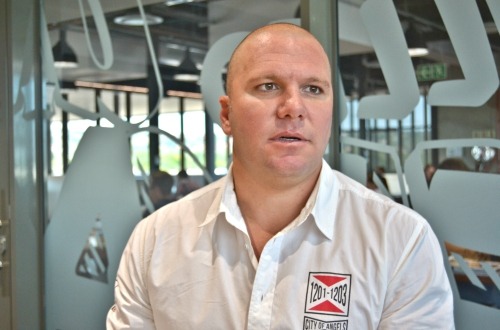
Every month SME South Africa will be interviewing some of South Africa’s leading business people to share their insights on leadership and strategy.
Gideon Galloway (39) is the founder and CEO of King Price, a short-term insurer which entered the local insurance market a little over three years ago selling itself as the more affordable and relatable alternative.
Galloway has not been shy about sharing his frustration with the lack of innovation in the industry. King Price is his chance to do better, he says.
The motivation for the business was two-fold, says Galloway – profits and to disrupt a very traditional industry. In three years the company has garnered over 100 000 clients.
“The business model is massively scalable and if done correctly, it is very profitable. We also spotted an opportunity to change the industry, because in my opinion it is dominated by fat cats, that don’t realise that the customer is becoming more discerning,” he said in a previous interview with SME South Africa.
We interview Galloway to find out how he hires, makes big decision and why he is more impressed by street smarts than a perfect CV.
“I think if you are passionate about you do then people will buy into it. So you don’t have to be a salesperson to make a sale”
Q: What were the biggest lessons you learnt from your first business?
The first is time. You underestimate how much time [a project] will cost you. Later on you learn that what you are billing just doesn’t cover the work.
You also learn the importance of support. For example if you are ill and can’t make it to work or are on a rugby tour, your clients call you on the phone. So you need that infrastructure.
About people, I also learnt early on that they don’t pay [laughs]. From a young age that was definitely the case. They would pay 50% and not the rest. So I learnt not to mess up the relationship when it comes to the billing part, I think being upfront is the best way. ‘This is the price and I’m not starting until I get 50% deposit.’
In general, I think if you are passionate about what you do then people will buy into it. So you don’t have to be a salesperson to make a sale. I think if you are knowledgeable about what you do and are passionate about doing it and you put up a smile then anybody will buy into you and your service.
But you can’t learn this stuff in a text book, you have to go out, meet the client and make the sale yourself. That’s where everyone starts, that’s the greatest lesson probably, to do it yourself and as you continue you learn ways to do it better. You just need to have the guts to do it.
WATCH: Galloway on learning from others early in his entrepreneurship career
Q: Take us through the process of making a big decisions. Who do you talk to, what do you consider?
I generally have a good gut feel and I’ve learnt to trust it extensively over the years. Sometimes even when something doesn’t make sense, if my gut feel is to go with it then I will normally trust it and it has always worked for me.
But I always get input from the experts and people around me. If after the input my gut feel is still to go the other way, I will still probably go with it.
But a lot of times I do change my mind. If three of my colleagues tell me they really feel a certain way I will go with them.
In a team like King Price there are so many experts I seldom get into a situation where it’s a really tough call.
With other business decisions, like investing in a company, after I look at the business plan, what I do is take emotion out of it. When you invest something you must be prepared to lose it as well, that is the risk that you weigh up.You make a decision and go. If it’s a mistake don’t be too hard on yourself. For me I guess, I like making decisions but I make them quickly. I think if you delay them too much it gets harder. Rather make the wrong decision quickly.
Q: Do you consider yourself to be a startup or corporate CEO?
I’m definitely more of a startup CEO, without a doubt, because I get bored quite easily and I always want to grow. So for me, maintaining a big company just isn’t an interest of mine. But I guess it also depends on the business itself. When I headed up my ad agency, it was a lot more hands on. We didn’t have as many high level executives like I do here at King Price. Here there is absolute freedom. Everyone can do what they want because they are all experienced enough to know what the result will be and you can just leave them.
In both scenarios the qualities I think you need as a CEO are that people must be able to follow you. Can you lead people? Will they follow you?
There are a lot more leaders that can maintain a company than can start a company. For a startup, you need to be able to get your hands dirty, order the coffee. From the smallest little thing to the biggest things. It takes a certain person to do that. That’s why I probably wanted to own a business, the absolute freedom to be your own boss and create stuff.
Q: How do you choose your team?
If it’s the next venture, then it’s obviously the opportunity that comes your way. With King Price as we expand into other countries we decided that we are not doing it the normal method which is, let’s look at a country, its economic situation, size all those things and you choose a country. It almost never makes sense, it’s always because someone in the room wanted to go there.
We decided that an entrepreneur from a specific country will approach us. He will have the skills, would have left his job and put in his own money. We get a lot of those proposals. And we decided that is what we like.
If I am approached personally to invest I look to see if the business has a good model, if it’s viable and a great idea. The biggest consideration for me is, do I like this guy? Can I trust him? Is it going to enhance my life going forward or my portfolio?
“I like making decisions, but I make them quickly, I think if you delay them too much it gets harder”
WATCH: Galloway talks about his definition of a leader
Q: How do you choose who to hire?
There are two ways that I hire. The first is if there is a need. The second is I meet crazy individuals sometimes who you know that no matter what you give this guy he is going to make a success of it. Then you just appoint them. There is a lot of examples of that at King Price.
For example a guy called Stefan come to pitch an app. I told him I am not interested in your app but I like your presentation skills and crazy thinking, so we employed him in the culture portfolio. He comes up with crazy ideas. And I just appointed him immediately. And it’s quite a senior post.
When there is a need to find someone we go through the CVs and interviews. But it will always comes down to culture fit. Someone that you like and can get along with in the team, more than the CV.
Street smarts, for me, is more important than text book knowledge so the qualification is not as necessary for me as does this person have a great attitude? Do they have what it takes to do the job skillfully and do they have a track record?
I also like employing people I know which goes counter to what some people think, which is don’t mix business with family and friends.
I consider everyone working here my friend. If you can separate work and friendship then it works. Because your friends have the same values, the same vibe normally, so it’s easier to work together towards one vision.
I guess it can get difficult in tough times when the business isn’t going that well. But even then I’ve closed down lots of businesses with some of my friends and if you don’t get emotional about it and you can draw the line between friendship and work then it’s not that difficult.
WATCH: What goes into executing a killer idea? Galloway lets us in on how he knew King Price was a solid idea
“There are a lot more leaders that can maintain a company than can start a company”
Q: What’s your relationship with risk?
You manage it [laughs]. I put all my money into King Price, all of it and I almost lost all of it. King Price took four years and 42 pitches. A pitch is three hours of work and three hours presenting. You have to secure an meeting first then it’s the due diligence process which takes a month or so, only to find out that you are not agreeing on the shareholding or something then it’s on to the next pitch.
But I like risk, without risk there is no reward, and I am young I can still take quite a lot of risk. The one thing I don’t like is uncertainty. I just want to know if I am in trouble rather than not knowing, then I can deal with it. I want to know the absolute worst that can happen. Normally, if you write the worst thing that can happen down then the rest is not scary anymore and will almost never happen. Unless you just focus on it until it happens.


